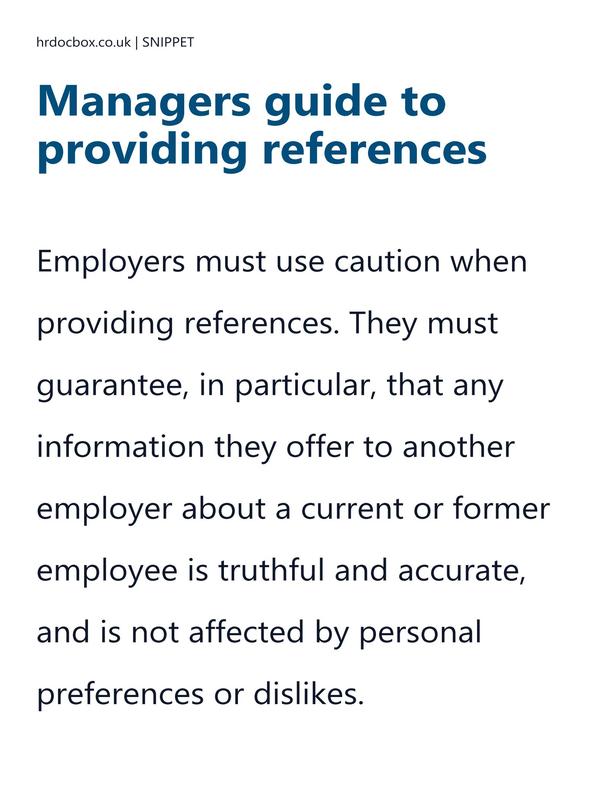Managers guide to providing references


This guide examines the legislation and practice guidelines for references. It contains advice on both offering and obtaining references, as well as an overview of relevant Data Protection guidelines.
- Includes 12 months' access to the Managers guide to providing references, with all updates provided free of charge and notified to you.
- UK-specific accuracy.
- 1,034 words over 3 pages.
- Last updated 01/08/2024.
- Format: Word / PDF / plain text / email.
- Delivery: Instant download after purchase (no physical item).
- Access: Download link shown here after checkout.
- This Managers guide to providing references will SAVE you up to 2 hours research, save you money, and reduce your risk.
Managers guide to providing references
Employers must use caution when providing references. They must guarantee, in particular, that any information they offer to another employer about a current or former employee is truthful and accurate, and is not affected by personal preferences or dislikes.
As a result, organisations should implement a policy that allows only identified managers (or an HR manager) to submit references on behalf of the organisation. Such a strategy should be followed for both written references and those obtained over the phone.
Is it appropriate for an employer to provide a reference?
Many businesses have a policy of not providing references or of simply providing basic information such as the person's job title and dates of employment. While this strategy avoids legal difficulties, it is inconvenient for other employers who may benefit from accurate, true information about, say, the individual's talents and performance.
A reluctance to offer a reference without an explanation is likely to be viewed as an indicator that there was an issue with the individual about whom the reference was asked. As a result, if the company has a policy of supplying just the most basic information in references, the fact that this is its general policy should be disclosed.
What information should a reference contain?
If their company chooses to offer references, referees must ensure that the references they send contain only truthful information. They should not contain any personal views or comments on the employee's performance or behaviour that cannot be supported by facts. Such viewpoints are susceptible to prejudice, whether intentional or unintentional.
If requested, referees can include factual information such as the following without any issue:
-
the beginning and end dates of the individual's employment with the organisation;
-
the job title of the individual;
-
a brief explanation of the employee's primary work responsibilities and level of responsibility;
-
if the employee has had any disciplinary warnings in the past two years;
-
Where the individual has left the job, the reason for the termination, i.e. whether they resigned or the organisation terminated them, and if the latter, whether the termination was the consequence of dismissal, redundancy, retirement, or the expiry of a fixed-term contract.
Referees should only mention facts that the employee is aware of when providing references.
In one case, the Court of Appeal stated that unfavourable assertions made in a reference should be included only if the relevant things had first been submitted to the individual and there are reasonable grounds to assume that they are accurate.The disputed reference in that case implied that the employee had been permitted to retire in circumstances where he would have otherwise been dismissed for dishonesty. The Court ruled that this was incorrect and unjust because the allegations had not been properly investigated, and there had been no formal disciplinary hearing.
The legal position on providing references
Employers are not required by law to provide job references. However, there is an exception to this general rule for companies in the financial services business. Their regulatory agencies require them to acquire and submit references for prospective workers.
Duty of care
Although employers are not required by law to offer references for current or former workers, if they do so, they owe a duty of care to both the employer who sought the reference and the individual who is the subject of the reference.
To satisfy the manager's duty of care in relation to the topic of the reference, the management must compile the reference with care, ensuring that the contents of the reference are factual, accurate, fair, and not misleading.
Where an individual has had issues, for example, if he or she was dismissed for serious misconduct, nothing prevents the employer from providing the pertinent facts, provided such facts are known to the individual and conveyed honestly and truthfully. It is not possible to sue an employer for stating the truth. However, it might be sued if it fails to provide critical facts or makes misleading or incorrect assertions.
Duty to the other employer
An employer who provides a reference has a responsibility to the organisation that sought it.
In principle, an employer might be responsible for damages if he or she does not disclose the truth about an employee and the new employer suffers financial losses as a result of, say, the employee's incapacity.
Data protection
Managers must take care not to breach an individual's rights under the General Data Protection Regulation while providing a reference (GDPR). They should not issue a reference unless they are confident that the employee agrees to it. When an employee leaves a company, the employer should retain a record of whether or not the employee agrees to references being supplied to potential employers or third parties. The employee should also have the ability to revoke his or her permission at any moment.
Discrimination claim risk
In cases when a previous employer has refused to offer a reference or issued an unfavourable reference, a former employee may bring a claim of unlawful discrimination to an employment tribunal.
This circumstance may emerge if the cause for the employer's actions (or inaction) is related to one of the 'protected characteristscs', which include sex, transgender status, marriage or civil partnership, pregnancy or maternity, race, disability, religion or belief, sexual orientation, or age.
For example, if the basis for rejecting a reference or making unfavourable claims in a reference was because the ex-employee had filed a claim for racial discrimination against the employer while still employed, this would be an act of victimisation and illegal race discrimination.
It is also critical to maintain consistency and impartiality when providing references to former workers. If the employer does not, an ex-employee may be entitled to file a claim that he or she was treated unfairly, for example, because of age or disability.
There is also a danger of discrimination if the employer exposes information about a former employee's absence, because a potential employer may decide not to hire the employee if he or she has taken a lot of sick leave due to a disability. As a result, the manager should avoid include the number of days of sickness absence in the reference.
Managers guide to providing references purpose
This Managers guide to providing references aims to offer you a versatile and customisable tool, serving as a solid foundation for your needs. Utilise it to ensure consistency, enhance accuracy, and save valuable time.
Adapt it to suit your unique requirements, ensuring efficiency and effectiveness in your HR processes.
Frequently Asked Questions about a Managers guide to providing references
Frequently Asked Questions about a Managers guide to providing references
-
Can I use the Managers guide to providing references in my small business?
Yes. The Managers guide to providing references is designed to be flexible and suitable for organisations of all sizes, including small businesses and charities. It follows UK employment law best practice, so even if you don't have an in-house HR team, you can confidently apply it.
-
Is the Managers guide to providing references compliant with 2026 UK employment law?
Absolutely. Like the Managers guide to providing references, all of our templates are drafted with the latest ACAS guidance and UK employment legislation in mind. We review and update them regularly, so you can be confident they remain compliant.
-
Can I customise the Managers guide to providing references for my organisation?
Yes, we highlight the areas of the Managers guide to providing references that you need to update with your own details, and where you need to make decisions to suit your situation. This saves you time and ensures that you meet best practice.
-
Do I get instant access to the Managers guide to providing references?
Yes. Once purchased, you'll be able to download the Managers guide to providing references instantly. Templates are provided in editable Word or Excel format so you can customise them easily, and in PDF format for easy sharing.
-
What if I need more help, not just a Managers guide to providing references?
If you're looking for broader support, we also offer toolkits and library bundles that include the Managers guide to providing references, along with other HR templates and policies for fully managing your situation. These may be more cost-effective if you need deeper advice.
-
Why should I use this Managers guide to providing references, and not AI to generate it?
The risk of using a free AI-generated template 'without review' includes your legal exposure, missing context, and no awareness of the wider process, whereas purchasing the Managers guide to providing references from us mitigates that risk.
